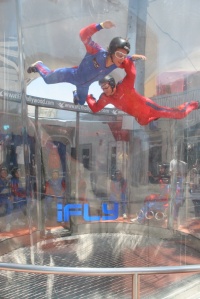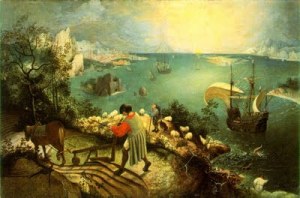 Now that we’re in back-to-school mode it’s time to get a little classical with our parenting perspective. One of the great stories in the mythology canon is that of Daedalus—the brilliant inventor father who creates wings of wax and feathers so that he and his son, Icarus, can escape from Crete where they are being held prisoner. As they prepare to take literal flight, father warns his boy to be mindful and fly right—too low and the ocean moisture will ruin the wings, too high and the sun will melt the wax; but alas, young Icarus, with nary but a learner’s permit as far as flying goes, gets over-excited about his new-found power and freedom and up he goes… until melting wax and… down he goes. Splash!
Now that we’re in back-to-school mode it’s time to get a little classical with our parenting perspective. One of the great stories in the mythology canon is that of Daedalus—the brilliant inventor father who creates wings of wax and feathers so that he and his son, Icarus, can escape from Crete where they are being held prisoner. As they prepare to take literal flight, father warns his boy to be mindful and fly right—too low and the ocean moisture will ruin the wings, too high and the sun will melt the wax; but alas, young Icarus, with nary but a learner’s permit as far as flying goes, gets over-excited about his new-found power and freedom and up he goes… until melting wax and… down he goes. Splash!
And although poor Icarus is a goner, because it’s a myth (and a dusty old one at that), we tend not to get too worked up about his demise. From a kid’s point of view, the story is a morality tale meant to get kids to heed our parental warnings, and most kids probably think, “yeah-yeah, if anyone ever gives me wax and feather wings I’ll be sure to watch out for that sun.”
 And then along comes parenthood, and our cynical and arch perspective gets shaken and displaced by our attachment to our children, and by our increasing sense of our own non-invincibility… just as our kids are readying to spread their gossamer wings and scare us into over-protective mode.
And then along comes parenthood, and our cynical and arch perspective gets shaken and displaced by our attachment to our children, and by our increasing sense of our own non-invincibility… just as our kids are readying to spread their gossamer wings and scare us into over-protective mode.
As a father, the story of Icarus truly became the story of Icarus and Daedalus, and it had an entirely different effect on me than the intellectual slant of college essays and symbolic meanings of hubris (i.e. over-reaching our human role and grasping for god-like powers). I now found myself identifying with Daedalus and the irony of a father inventing wings to save his kid, and then having his own handiwork contribute to his son’s demise. It’s downright Greek, this tragic prospect of watching one’s child fly too close to the sun and then fall tragically to their death… images of swan-dives off the World Trade Center mingled with the sparkle of the sea in my mind’s eye.
As a kid, this story effectively ends when Icarus crashes, but as a parent I found myself following the story on to its end, where Daedalus hangs his wings in the temple of Apollo, abashed, grief-stricken and vowing never to fly again. And I felt something I hadn’t felt before from a Greek myth: moved. The sorrow of this imagined moment of loss, albeit woven of whole cloth, mingled with personal memories of my childhood friend’s death, and his parents’ grief and together touched an archetypal nerve whose root taps deep into attachment, loss, love and striving—pulsing with life spirit eons after it was first told around some pre-classical fire, perhaps both banking on, and trying to make sense of, the real human losses that our common ancestors undoubtedly faced… and transcended by handing on the torch of our own spiraling DNA.
So let’s dedicate today to recognizing the classical antiquity of our bones and our DNA, the wisdom of our neurons which not only make these stories up, but which discover them, projected onto flickering cave walls and on the firmament—ever reflecting of our essential natures and our timeless love for all our collective children, mythical and “real,” spanning across the arc of time.
Namaste, Bruce



{ 3 comments… read them below or add one }
Hi Bruce,
So the thing that really struck me about this particular entry was not the story, though it is a wonderful one. What hit me was your ability to make the story timely and bringing it from the past into the present. The way you wrote it allows me to have a visceral connection with our ancestors and I see how these stories keep us connected through time.
Namaste
Though I have read this story many times, the way you spoke of it brings a stinging to my eyes,and a better appreciation.
Thanks,
krk
Bruce, I stumbled upon this when looking for a way to illustrate the story to my English class. I’m ashamed to say that, even as a parent, I’ve not really considered it from Daedalus’ point of view before. Thank you for giving me food for thought!